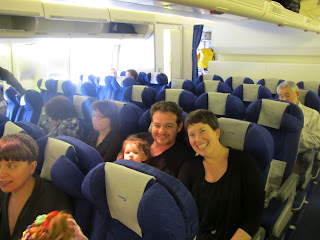
If the flap of a butterfly's wings might create atmospheric changes on the other side of the world, what to say of a tornado in Dallas? It created big changes for my wife, daughter and I.
It all started on April 3rd, 2012, the beginning of our trip to Moldova. We were supposed to catch a plane from LAX to Dallas at 6AM. When we get to the airport we find out the flight had changed to 9AM! Better safe than sorry, but we could have used a couple more hours of sleep.

Still at LAX
The flight to Dallas eventually happened, and everything was going well until the pilot announced that a severe tornado had hit the city, destroyed part of the airport and some aircrafts. We were then rerouted to San Antonio and had to wait in the plane for an hour. Nobody knew if we would continue our flight to Dallas or had to stay in San Antonio. We finally were authorized to get off the plane to soon learn that actually we were boarding again - now finally to Dallas. Needless to say that the airport was chaotic, many flights were delayed, people were nervous, shouting, families with babies like ours were also exhausted - not an easy situation for anybody.
It took us 9 hours to get to Dallas, we missed all of our subsequent connections, causing unforeseen consequences to us.
First, there were no more flights to Frankfurt that evening. We had to fly to London and then Frankfurt. That alone was tiring. When we got to London, the security officials took out all of Melina's medicine, saying we couldn't had those, but we could buy substitutes in the local drugstore. It so happened that the local drugstore didn't have the medicine we needed!
We arrive at Frankfurt in the evening of the 4th, missing our flight to Moldova. I was getting ready for that, but to my surprise our luggage was nowhere to be found. Being unable to book a next flight to Moldova and needing to wait for the luggage to arrive, we were forced to go to a hotel. To make things worse, Melina had threw up on us during the flight to London, so we were stinking and unable to change clothes. But glad to have a bed to lay down.

Next day, the 5th: we find out the next possible flight to Moldova is only on the 6th and that our luggage may be coming to the hotel by 4PM. Great, we now just need to wait, relax, eat some real food, etc. But at 4PM, nothing came. 5PM, not a word from British Airways. I called them and the lovely lady says: "your luggage was sent to Moldova" No!!!! And then she said "let me actually try to contact them and see if they can still retrieve your bags and send it over to the hotel".

"Where is our luggage???"
To make a long story short, the 5th was not all about relaxing, but a lot about waiting for a response on our luggage - that finally came at 10:30PM! I felt utterly happy, almost crying. Now we had everything and we knew we were going to Moldova.

Need some hot coffee!!!
Several times during the flight to London, and especially when Melina got sick, I thought of returning to our home in LA. "Maybe it's not this time", "What was I thinking, taking a baby in this crazy long journey?" But no, it was meant to be. All of our misfortune were meant to happen - it was only because we had to stay 2 days in Frankfurt that we got to meet for the first time our long distance cousin Alla Malamoud, who lives in Frankfurt and whose mother was a Tolpolar. It was an amazing meeting of two generations of Tolpolars that finally got together after 85 years.

Alla and Melina
Next day, the 6th: we boarded the plane to Moldova. During the check in, I see what it looked like a convicted man being escorted by two policemen. I pointed it out to Lara. And what were the odds? The prisoner sat next to me in the plane to Chisinau! It was all fine, but I was so exhausted by then that imagined him sticking a knife into my neck, and could not relax during the flight.
It took us 4 days and 5 planes to get to Moldova. I will tell everything about our time there. But needed this big intro so you can understand that this was no usual trip. Much more was yet to come.




















































